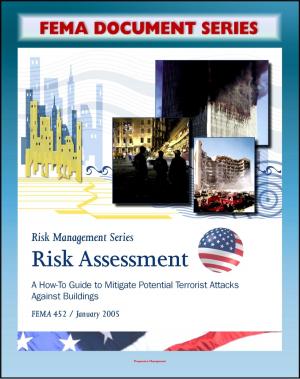A Handbook of Aerospace Defense Organization 1946-1980: History of the Air Defense Command and the Aerospace Defense Command - Air Defense in World War I and II, Cold War Era, Squadrons
Nonfiction, History, Military, Aviation, World War II| Author: | Progressive Management | ISBN: | 9781310366635 |
| Publisher: | Progressive Management | Publication: | April 22, 2015 |
| Imprint: | Smashwords Edition | Language: | English |
| Author: | Progressive Management |
| ISBN: | 9781310366635 |
| Publisher: | Progressive Management |
| Publication: | April 22, 2015 |
| Imprint: | Smashwords Edition |
| Language: | English |
Professionally converted for accurate flowing-text e-book format reproduction, this handbook is intended as a reference to air defense organizations of the USAF, principally of the Air Defense Command and later the Aerospace Defense Command, from 1946 to 1980. Section I is a brief summary of the evolution of the air defense mission. Section II lists major changes in air defense organization from .the formation of Air Defense Command in 1946 to the inactivation of Aerospace Defense Command 34 years and 10 days later. The remaining two sections provide lineage information on organizations from air forces through squadrons.
At the outbreak of war in 1914 the problem of defense against air attack had been hardly considered. Aircraft performance was so limited that little more than reconnaissance flights over the lines could be undertaken. During the first three years of war the remarkable improvement in aircraft of both sides was not matched by a comparable improvement in the means for air defense. On the Western Front air defense was not considered a special factor in the overall conduct of the air war. Few air tactics were developed specifically for air defense, combat air patrols generally doubling for both offensive and defensive purposes. However, large numbers of antiaircraft guns and searchlights were eventually emplaced behind the lines and a few captive barrage balloons were added for defense of specific targets. Then as now, the problem of early warning was of great importance. Ground observers at the front reported by telephone the approach of hostile aircraft and were assisted eventually by sound locating devices. Effective air defense of ground forces on the Allied side of the lines was. achieved by mid-1918 only through Allied air superiority.
SECTION I * Air Defense in World War I * Air Defense Between the Wars * Air Defense in World War II * Air Defense in the Cold War Era * SECTION II * Major Changes in Command Designation * A Chronology of Changes in ADC Organization * SECTION III * Air Defense Forces * Air Forces * SECTION IV * ADCOM Regions * Air Divisions * Air Defense Sectors * Centers * Wings * Groups * Air Force Bands * Squadrons * Airborne Early Warning & Control * Aircraft Control & Warning * Air Defense * Air Intelligence * Civil Engineering * Communications * Communications & Electronics Maintenance * Drone * Evaluation * Fighter-Interceptor * Ground Observer * Installations * Maintenance * Materiel * Missile Warning & Surveillance * Operations * Radar * Special Activities * Tow Target * Test * Training * Flights * Schools * GLOSSARY OF ABBREVIATIONS
Professionally converted for accurate flowing-text e-book format reproduction, this handbook is intended as a reference to air defense organizations of the USAF, principally of the Air Defense Command and later the Aerospace Defense Command, from 1946 to 1980. Section I is a brief summary of the evolution of the air defense mission. Section II lists major changes in air defense organization from .the formation of Air Defense Command in 1946 to the inactivation of Aerospace Defense Command 34 years and 10 days later. The remaining two sections provide lineage information on organizations from air forces through squadrons.
At the outbreak of war in 1914 the problem of defense against air attack had been hardly considered. Aircraft performance was so limited that little more than reconnaissance flights over the lines could be undertaken. During the first three years of war the remarkable improvement in aircraft of both sides was not matched by a comparable improvement in the means for air defense. On the Western Front air defense was not considered a special factor in the overall conduct of the air war. Few air tactics were developed specifically for air defense, combat air patrols generally doubling for both offensive and defensive purposes. However, large numbers of antiaircraft guns and searchlights were eventually emplaced behind the lines and a few captive barrage balloons were added for defense of specific targets. Then as now, the problem of early warning was of great importance. Ground observers at the front reported by telephone the approach of hostile aircraft and were assisted eventually by sound locating devices. Effective air defense of ground forces on the Allied side of the lines was. achieved by mid-1918 only through Allied air superiority.
SECTION I * Air Defense in World War I * Air Defense Between the Wars * Air Defense in World War II * Air Defense in the Cold War Era * SECTION II * Major Changes in Command Designation * A Chronology of Changes in ADC Organization * SECTION III * Air Defense Forces * Air Forces * SECTION IV * ADCOM Regions * Air Divisions * Air Defense Sectors * Centers * Wings * Groups * Air Force Bands * Squadrons * Airborne Early Warning & Control * Aircraft Control & Warning * Air Defense * Air Intelligence * Civil Engineering * Communications * Communications & Electronics Maintenance * Drone * Evaluation * Fighter-Interceptor * Ground Observer * Installations * Maintenance * Materiel * Missile Warning & Surveillance * Operations * Radar * Special Activities * Tow Target * Test * Training * Flights * Schools * GLOSSARY OF ABBREVIATIONS















